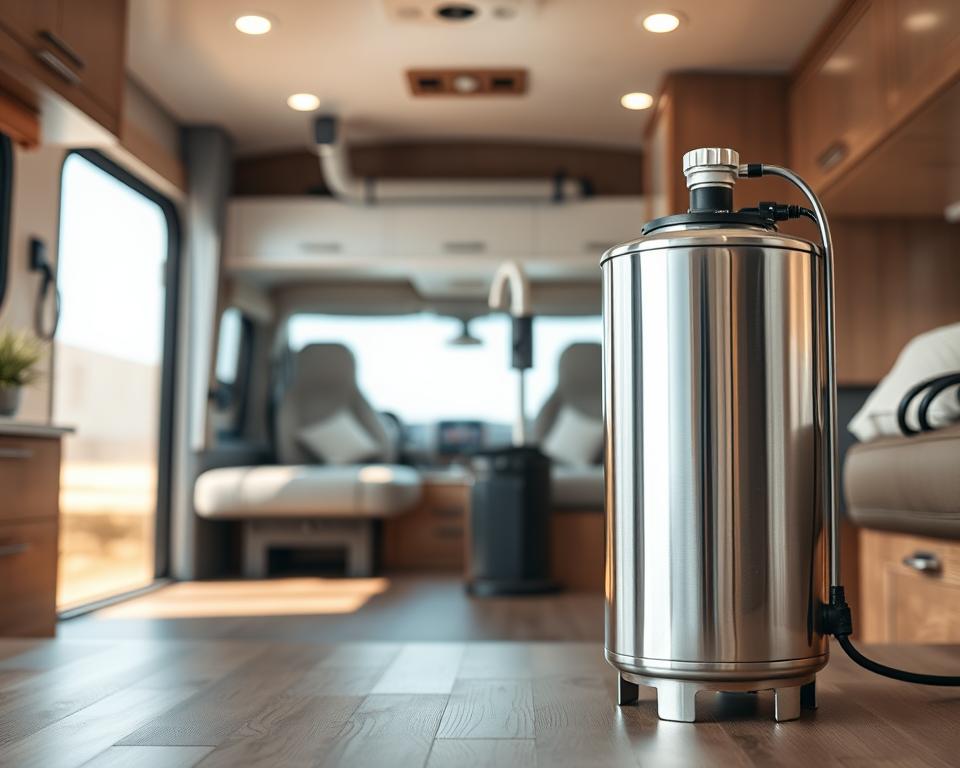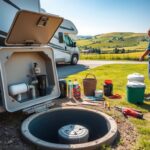RV Black Water Pump: Critical Maintenance Guidelines
Is your RV’s black water pump really set for the highway, or might it cause camping woes? Maintaining your motorhome’s waste system in prime condition is essential. It lets you avoid nasty scents, blockages, and pricey harm. Here are important advice to make sure your sewage pump functions seamlessly, keeping your travels trouble-free.
Grasping Your RV’s Plumbing System
The RV plumbing system is fundamental for any smooth journey. It separates into two main parts: the black water system and the gray water system – camper septic pumping. The black water system captures waste from the toilet, while the gray water system deals with wastewater from sinks and showers.
The systems utilize drain lines that direct toward different tanks, designed for efficient waste management. Each tank has a vent to prevent gas from building up, keeping the operation is safe and smells fresh. Proper waste management in an RV is critical to avoid leaks or bad odors. By familiarizing yourself with both black and gray water tanks, RV owners can look after and manage waste better.
Understanding how your RV’s plumbing works helps spot issues promptly. Scheduled maintenance makes trips smoother for everyone. Staying ahead with your RV’s plumbing system delivers reliability during your travels.
Types of Tanks
Owning RVs involves being aware of the different tanks. Each one is essential to your RV’s operation, needing regular upkeep.
The fresh water tank stores cook-and-drink water. It’s necessary for a pleasant RV experience.
The gray water tank holds sink, shower, and other non-Septic wastewater. Overseeing this tank keeps your RV clean while traveling. The black water tank, on the other hand, contains toilet waste. It needs routine emptying and careful maintenance to avoid issues.
By understanding the fresh, gray, and black water tanks, RV owners can better handle their systems. This planning and ongoing maintenance deliver smooth running of the waste management system.
Functioning of RV Black Water Tanks
The function of the black water tank is key in RV waste management. It receives waste from the toilet via a gravity-fed system. Upon flushing, waste and water are guided toward the tank, to be stored until removal is necessary. It’s imperative to keep water levels optimized in the toilet to avoid solid waste buildup.
Understanding how RV waste tanks function can circumvent clogs and odors. Without proper care, solid waste hardens, causing blockages and emptying difficulties. Comprehensive tank flushing techniques are vital to preventing these issues, securing smooth functionality.
Frequent inspection of tank mechanics is advised for RV owners. This includes watching flushing methods and keeping adequate water flow. Practicing these essentials facilitates efficient tank maintenance, dodging expensive fixes later.

Crucial Maintenance Tips for Your RV Black Water Pump
Performing regular maintenance on your RV’s black water pump is vital. Begin with choosing RV-safe toilet paper to lessen clogs and improve flow. A complete flush can remove waste and reduce bad smells. Consistently cleaning the tank helps avoid residue buildup, guaranteeing your RV sanitary and comfortable.
Conduct periodic inspections to monitor your pump’s condition. Watch for any signs of wear or damage that could reduce its function. Using specialized tank treatments, like those from All in Sanitation, can greatly improve both performance and cleanliness. Applying these tips can increase your pump’s life and improve your RV’s living conditions.
Use RV-Safe Toilet Paper
Looking after your RV’s black water system demands crucial measures. One critical move is using RV-safe toilet paper for clog prevention. This purpose-made product decomposes quickly in water, suited for RV sanitation systems.
RV-safe toilet paper is crucial for tank maintenance. It dissolves fast, avoiding blockages from slow-decomposing materials. This boosts waste disposal efficiency and keeps the plumbing free-flowing.
Opt for brands identified as RV-safe when buying toilet paper. These products lessen clog risks and boost your black water tank‘s lifespan by sidestepping buildup. Regular use ensures a stress-free camping experience, without plumbing troubles.
Complete Tank Rinsing
Deep-flushing your black water tank is essential for responsible waste management in your RV. To aid waste movement, verify the toilet bowl is sufficiently watered before flushing. Many RVs are equipped with built-in tank flush systems to make the process more efficient. For RVs without this feature, employing tank rinsers that attach to the sewer outlet offers a solid alternative.
Consistent tank flushing assists waste removal and wards off solid accumulations and bad smells. Maintaining this process secures your RV stays odorless, making your travels more enjoyable. A focus on regular and complete tank flushing will upgrade hygiene and the overall condition of your RV’s plumbing system.
Avoid Gunk through Routine Cleansing
Maintaining your RV’s black water tank free of buildup is vital for its peak function. Frequent cleaning removes lingering waste inside the tank walls. This means washing well with water and using specific RV tank cleaners for tough deposits.
By cleaning faithfully, you stop odors and minimize clog risks. A spotless tank makes RVing better and helps your plumbing last longer. Add tank maintenance into your routine to guarantee smooth travels.
Picking Suitable Additives
Opting for proper chemicals for RV black water pump maintenance is critical for managing waste and eliminating smells. Many RV enthusiasts rely on enzyme-based RV holding tank treatments. These products use good bacteria to break down solids and cut down bad odors.
Keeping away from harsh chemicals is important to prevent damage to your plumbing. Such substances can corrode pipes, leading to high repair bills and diminishing your RV enjoyment. Applying safe chemicals for odor control guarantees your tank and pump’s longevity.
Holding your RV black water tank in top condition improves your travel experience. Using the right holding tank treatment regularly secures your system works well.
Timely Tank Emptying
It’s crucial to empty your RV’s black water tank at the correct moment for effective disposal. Try to empty when the tank is about two-thirds full is sensible. This prevents solid waste buildup, providing a quicker emptying process.
Emptying at approved stations is imperative for safe, eco-friendly waste handling. It’s essential to keep an eye on the tank‘s levels closely. Letting it max out can cause clogs and make disposal more difficult.
Proper timing and methods are essential for hygienic waste management and can lengthen your plumbing’s life. Maintaining steady oversight and maintaining your system correctly delivers a pleasant RV living experience.
Maintaining Toilet & Tank Seals
Reviewing seals around the toilet and tank is vital for leak prevention. Over time, these seals might degrade, leading to odors and potential harm. A comprehensive inspection will reveal any wear or damage. Catching issues early makes possible quick replacement to guarantee a secure connection and odor-free RV.
Keeping a bit of water in the toilet bowl assists in preserving seal condition. This protective habit is essential in RV seal upkeep. It prolongs the seals’ life, stopping leaks and foul odors.
Periodic seal maintenance can forestall expensive repairs later. By prioritizing seal health, RV owners secure a pleasant journey.
Extra Strategies for Ongoing Upkeep
Setting up professional servicing for your RV at least once a year is sensible, particularly for black water tank care. This strategy aids in catching trouble fast and upholds your plumbing system’s integrity.
When preparing your RV for storage, completely clean and empty the black water tank first. Consider antifreeze to protect from damage from remaining water during cold seasons. Taking this step is essential for safeguarding the system, ensuring it’s ready for your next adventure.
Steady reviews and preventive actions are key to lengthening your sanitation system’s life. Paying close attention to connections, hoses, and seals guarantees smooth operations. This method boosts your RV experience, making it enjoyable all year round.
Securing your RV’s black water pump is well-maintained is vital for a stress-free camping journey. By following the maintenance tips shared, you can keep your black water system functioning well. It’s important to focus on regular cleaning, applying correct flushing methods, and selecting appropriate chemicals for waste management.
By meeting these maintenance requirements, you will eliminate unpleasant odors and blockages. This also prolongs your RV plumbing system’s durability. Proactive care of the RV black water pump yields more time enjoying the outdoors, without concern for potential setbacks.
Bear in mind, proper upkeep is key next time you gear up for an outing. It’s not the highlight of RV ownership, yet it significantly boosts your travel experience.

